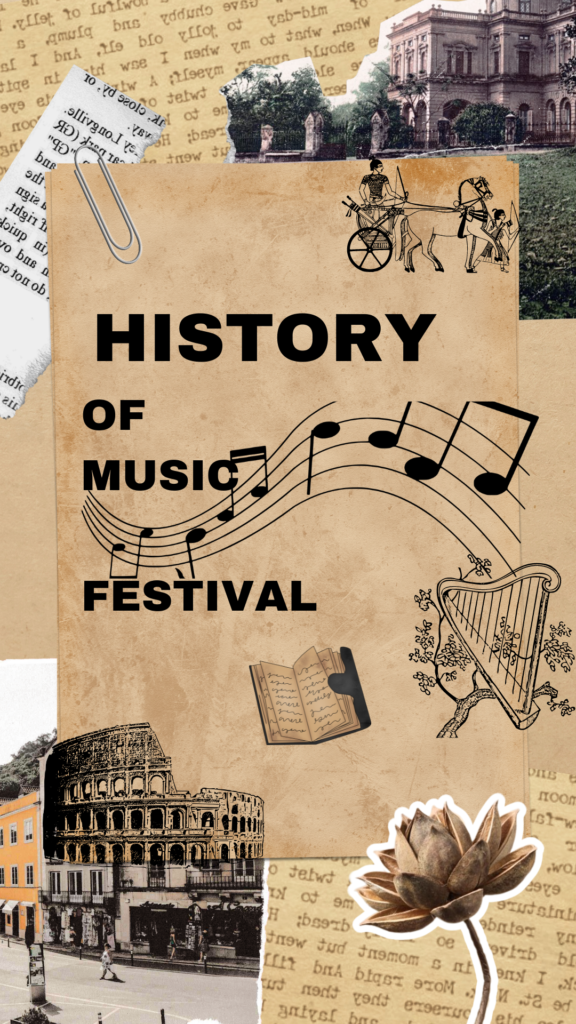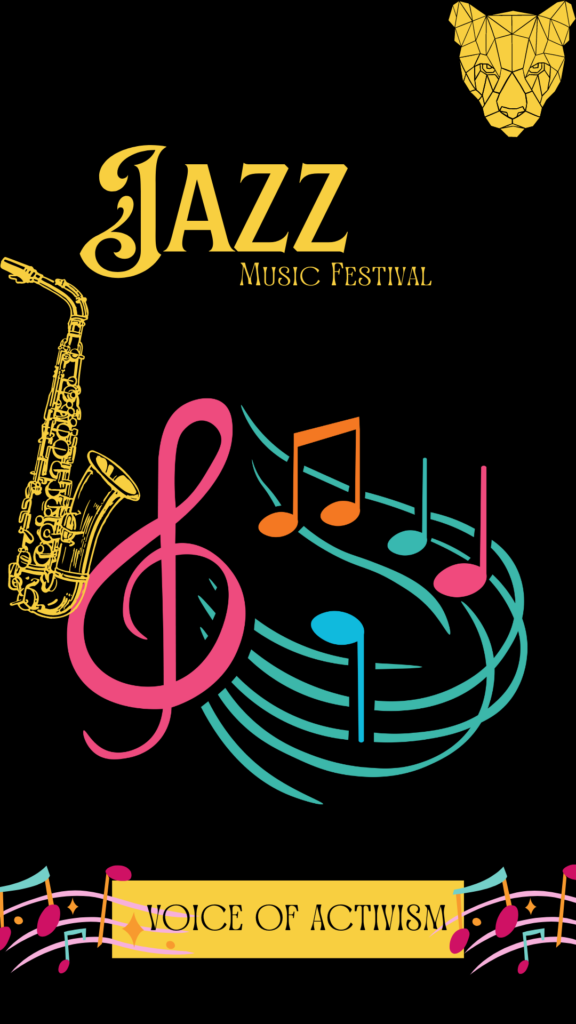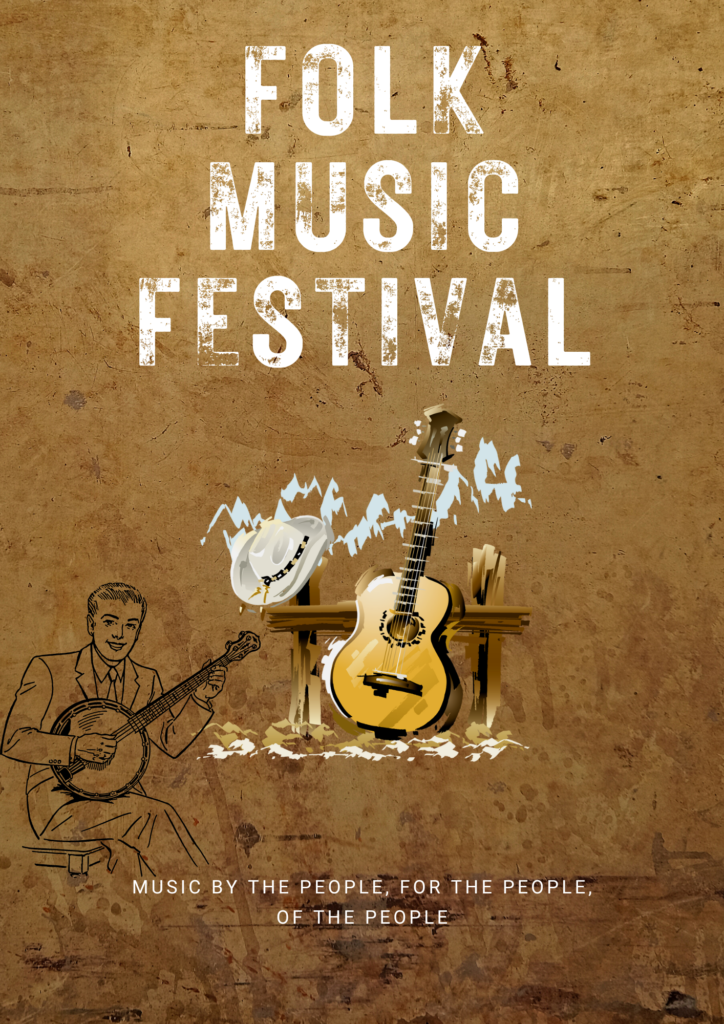Early Beginnings

Music festivals can be traced back to the ancient civilizations where the primarily involvement of music laid in the communal and religious celebrations. Therefore the early festivals were not about music it was more of a communal and religious practice which included music. It was religious in nature as well in the ancient civilizations of Greeks, Egyptians and Romans where they used music to honor gods, celebrate seasons and bring communities together. The ancient music festivals included live performances,dance and rituals like the modern day festivals.
Music festivals that started as a religious and cultural practice significantly converted to cultural event by the 6th Century. The first extraordinary music festival was conducted in the Greece. It was called the Pythian Games. The Pythian Games included musical performances along with athletic competitions in the Greek society. Festivals of these sorts served as entertainment purposes as well as strengthened the community bonds. They were also performed to celebrate divine worship. These festivals were important because of their capability to bring people together. They beginning of this festival marks the shared communal experience with deep cultural and religious overtones.
Since Medieval period the music festivals started its integration to the town life. Although it started entering into the town it did not completely devoid itself of its character of having the religious and cultural ethos. However the role of music became very important. It played a central role with minstrels,troubadors, and guild musicians performing in public squares and at the courts of nobility.
The small gatherings served as a messenger of important news. They were also important market places and cultural centre of the town. Thus, these areas were the focus point of a city where social bonds strengthened. The Three Choirs festival is one such festival that came up in the 18th Century and is still ongoing
The Renaissance as the name suggests was a phase of cultural uprising. It was during this phase Europe's classical scene gained prominence. Although it started as a spiritual offering however the scenerio slowly changed over time. Popular musicians like Bach, Handel and Mozart came to prominence. During this time music performances started becoming organized and stages were set up during performances. There was a cultural stimulation among the public hence they started enjoying music in an organised manner and appreciated it as a form of expression.
Jazz Festivals and Their Impact on the Music Scene
After the Renaissance period there was no new movements in the music. However 20th Century saw a new movement where jazz festivals came into being with the advent of jazz music. The Newport Jazz festival established in 1954 was the first outdoor festival of its kind. The Newport set a momentum for the future festivals worldwide.Jazz music was not any type of music. It became a mode of expression for the Afro-Americans and for the first time they got a platform to showcase their talent. It was different from Europe's music because it used the devil's note which made jazz distinguised from every other form of Music. Popular jazz musicians like Nina Simone and the Last Poets became big influencers. The jazz music festival were places of expression of freedom.They were symbols of resistance and became a bold voice for everyone who needs the help. This was the first time music became a part of social movement and since then it has helped people in expressing themselves at various points in time.

With the jazz movement parallel to it started another movement in the mid 20th century. The folk movement festivals emerged and highlighted the traditional music, storytelling and cultural heritage. The Newport Folk Festival, established in 1959 became a source of folk music revival. This festival featured legendary artists like Bob Dylan, Joan Beaz and Pete Seeger. These festivals were Hotspots of political activism and social commentary, reflecting the spirit of the times. Folk is known as the stories of people from the ancient period. Their portrayal of their lifestyle and struggle stems out of their history. Hence, the folk festivals always had a message for promoting peace, justice and equality contrary to the commercial music festivals.

In recent times music festivals are massive. Festivals like Lollapalooza in the USA, Glastonbury in the UK and Tomorrowland in Belgium have become a trademark when it comes to music festivals today. Just like the past, these festivals have much more than just music. Their diverse line-up, art installations, awesome delicacies, digital innovations all comtribute in making them a name. Their diverse lineup spans from electric and pop to rock and hip-hop. However, these festivals gives a larger than life experience and that makes it worthwhile.
1938 - The Newport Jazz Festival was founded, one of the earliest modern music festivals showcasing multiple performers
1959 - The Newport Folk Festival debuted, becoming a staple event for the folk music revival scene
1964-1967 - The Monterey International Pop Music Festivals established the template for large, multi-day rock music festivals
1969 - The Woodstock Music & Art Fair brought over 400,000 attendees together and became a seminal cultural moment representing the counterculture
1970 - The first Glastonbury Festival was held in the UK, blending folk, rock and other genres into a summer solstice celebration
1991 - Lollapalooza toured as an alternative rock festival across North America, highlighting the rise of the genre
1996 - The Coachella Valley Music and Arts Festival launched, later growing into one of the world's most prominent summer pop/rock festivals
2002 - The Bonnaroo Music Festival emerged, focusing on rock, jam bands and Americana music
2012 - Over 850 festivals took place globally, representing the maturation and diversification of the festival market
The Monterey International Pop Festival in 1967 set the stage which was followed by other well known festivals of today. This festival helped in setting several legendary artist's career with their performance. It was followed by Woodstock festival in 1969. It was one of the most iconic festival in history because it set a space for social, cultural and musical revolution. Artists like Jimi Hendrix and Janis Joplin created history by joining in the festival
Woodstock festival thus set the set ablaze and in modern times festival like Coachella, emerged as another monumental festival. Being a multi-genre festival Coachella is a show of music, art and fashion. Its massive and attracts celebrities and people from around the World making this festival a cultural hub. Coachella is held annually at multiple venues and hence we can say how massive the entire show is. The array of genres make it more appealing to a large crowd and hence it is a big name in the music festival arena.
Glastonbury Festival is the world's largest greenfield music and performing arts festival in the world. It has turned music festivals into huge cultural events. Glastonbury in Somerset, England started with a humble gathering back in 1970. Today this festival has a global impact featuring a diverse lineup spanning from genre to generations. Glastonbury is well known for its sustainable theme. It aims for environmental sustainability charity and the arts offering a vast array of performances, workshops and exhibitions. Glastonbury has the ability to bring music, culture and activism in the same plate ans that is what makes Glastonbury such an amazing festival.
The largest music festival in terms of attendance is believed to be the Donauinselfest in Vienna, Austria, which has attracted millions of visitors over a weekend. However, in terms of cultural impact and recognition, Woodstock in 1969 is often considered one of the most significant, despite not being the largest by numbers.
Tracing the evolution of music festival gives us the idea how they have evolved from ancient communal rites to a global phenomena and is telling a story of the social, cultural and political uprising. From the early Pythian days to Glastonbury Festival the music festival scene have massively changed. Intially it was for religious purposes only however now over the years Music Festivals like Coachella and Woodstock have become voice of activism and have made simple musical gatherings to politically motivated and culturally awakened one.
The music festival's promising attitude to unite individuals from different backgrounds keeping behind the cultural. geographical and societal indifferences and serving as stages makes it such a big phenomena. More than that it is also a place where talents are shaped and stars are born be it Lady Gaga or popular teen sensation Justin Bieber and Taylor Swift. The development of music festival not only serves as a mode of entertainment but in its core lies the hidden values of an evolving society that needs the attention of the hour.
Communicating the problems of society in a musical language is something that musical festivals are well known for. Be it Glastonbury speaking of environmental sustainability or the jazz festivals speaking of civil rights. These festivals marks the shared experiences and brings to the picture how far we have evolved.However, we must never forget that at the end of the day it is also a place if entertainment. Although it's cultural relevance is immeasurable but after a point it is also a place where people go for entertainment purposes only.
PEOPLE ALSO ASK FOR
The origins of music festivals trace back to ancient civilizations, with the Pythian Games in Ancient Greece, established in the 6th century BCE, often cited as one of the earliest examples. These games included musical performances alongside athletic competitions, celebrating the arts and community.
The Three Choirs Festival, originating in the 18th century in England, is considered the oldest ongoing music festival. It rotates annually among the cities of Gloucester, Hereford, and Worcester, focusing on choral and classical music.
The largest music festival in terms of attendance is believed to be the Donauinselfest in Vienna, Austria, which has attracted millions of visitors over a weekend. However, in terms of cultural impact and recognition, Woodstock in 1969 is often considered one of the most significant, despite not being the largest by numbers.
Music festivals serve multiple purposes: they are a celebration of music, art, and culture, providing a platform for artists to reach a wider audience and for fans to experience live performances in a communal setting. They also foster community spirit, cultural exchange, and can have significant economic benefits for their host locations.
While the Pythian Games are noted for their musical components, the concept of a festival predates these, with ancient religious and seasonal festivals incorporating music as part of broader celebrations.
The Newport Jazz Festival, established in 1954 in Rhode Island, is often recognized as the first music festival in the United States, focusing specifically on jazz music.
Before Woodstock, the Monterey International Pop Festival in 1967 is noted for being a precursor to the large-scale rock festivals that followed, including Woodstock. It featured performances by now-legendary artists and helped launch or bolster the careers of many.
Determining the "best" festival in history is subjective and varies based on criteria such as cultural impact, musical lineup, and personal experiences. However, Woodstock is frequently cited for its iconic status and the way it encapsulated the counterculture movement of the 1960s.
Music festivals aim to bring people together to celebrate and enjoy music. They provide artists with a platform to perform live and fans with the opportunity to see their favorite acts in person, often in a unique or communal atmosphere that differs from regular concerts.
People attend music festivals for various reasons: to see live performances, enjoy the communal atmosphere, discover new music, and participate in a cultural event that offers more than just music, including art installations, workshops, and food experiences.
The appeal of music festivals lies in their ability to offer a unique, immersive experience that combines music, art, and community. They provide a temporary escape from the everyday, fostering a sense of belonging and shared joy among attendees.
Whether music festivals are "worth it" depends on individual preferences and experiences. Many find the live music, vibrant atmosphere, and opportunity to connect with others over shared interests to be invaluable.
Australia has a rich history of music festivals, with events like Sunbury Pop Festival in the 1970s laying the groundwork for a diverse festival scene that now includes everything from rock and electronic to classical and jazz festivals across the country.
Music festivals have evolved from religious and seasonal celebrations in ancient times to large-scale, genre-spanning events that draw global audiences. This evolution reflects changes in society, music, and technology, with festivals now offering a wide range of experiences beyond just musical performances.
The UK has a long tradition of music festivals, from the Three Choirs Festival in the 18th century to the iconic Glastonbury Festival, first held in 1970. The UK's festival scene is known for its diversity, including rock, pop, electronic, and classical music events.
The origin of music festivals can be traced back to ancient times, where music was an integral part of religious, cultural, and social celebrations, evolving over centuries to become the multifaceted events we know today.
The Monterey International Pop Festival in 1967 is often credited as the first large modern rock festival, setting the stage for future events like Woodstock and influencing the format of music festivals for decades to come.
MusicFestivalsWorld is a dedicated online platform to help music lovers discover and experience the best music festivals worldwide. We provide information on upcoming festivals, tickets, stays, and artists, as well as blogs and videos to enhance the festival experience. We aim to make it easy for users to find the perfect festival and create unforgettable memories.
musicfestivalsworld.com 2024